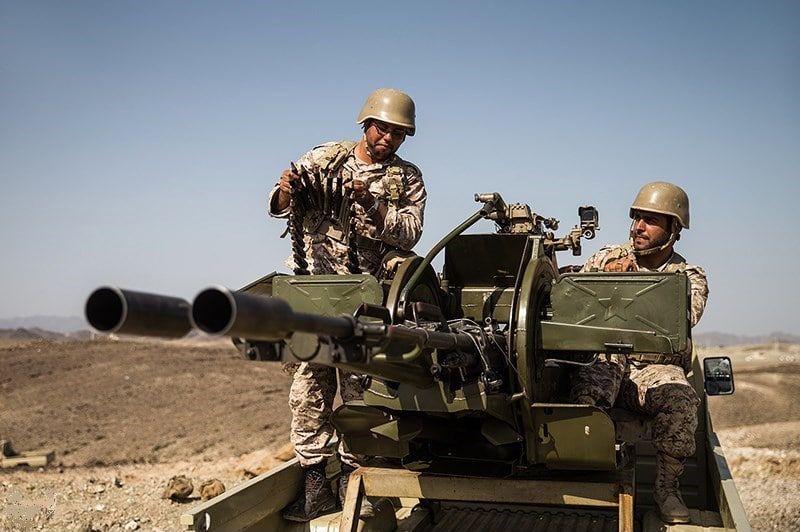Iran nuclear deal negotiators must act with urgency, given Iranian and Israeli nuclear brinkmanship
By Gawdat Bahgat | January 12, 2022
 A 2016 Great Prophet wargame in southeastern Iran. Credit: Hossein Zohrevand for Tasnim News Agency. License: Creative Commons Attribution 4.0 International. Accessed via Wikimedia Commons.
A 2016 Great Prophet wargame in southeastern Iran. Credit: Hossein Zohrevand for Tasnim News Agency. License: Creative Commons Attribution 4.0 International. Accessed via Wikimedia Commons.
In the last week of 2021, Iran carried out a wargame drill code-named Payambare Azam 17—”Great Prophet 17”—along its southern coastline. In one exercise, it simulated launching 16 missiles and five suicide drones in an attack that targeted Israel’s Dimona nuclear plant. The simulation, which the Jerusalem Post called a “dangerous escalation in rhetoric,” took place as nuclear talks between Tehran and world powers had stalled in Vienna.
“The message of this drill is a serious, real, and field warning to threats by the Zionist regime’s officials that they should take care not to make mistakes and faults,” Islamic Revolutionary Guard Corps Commander Major General Hossein Salami said, “and if they make mistakes, we will cut off their hands.” Less than two weeks later, pro-Iranian hackers posted on the Jerusalem Post website and Twitter account a photo of a model Dimona nuclear facility blowing up. They added the English and Hebrew message: “We are close to you where you do not think about it.”
If history is a guide, Israel may counter this Iranian threat. Whether such threats and counterthreats are psychological warfare or real is unclear. But both countries seem to have the military capabilities and political will to attack their neighbors. As wars are often initiated by a miscalculation by one side or both, brinksmanship targeting nuclear facilities should not be dismissed. In particular, US and Iranian diplomats in Vienna should engage in talks attempting to revive the 2015 Iran nuclear deal with urgency. An all-out war between the Islamic Republic and the Jewish State would deal a heavy blow to Middle East stability and American interests around the world.
To be clear, on the Iran-Israel nuclear landscape, Iran is not the only aggressor. Israel has intensified its attacks on Iran’s nuclear facilities and experts over years. More than a decade ago, Israel and the United States allegedly launched the Operation Olympic Games cyberattack, also known as Stuxnet, against Iranian nuclear facilities. In late 2020, the Israeli government assassinated Mohsen Fakhrizadeh—Iran’s top nuclear scientist.
In late 2021, senior US and Israeli officials reportedly discussed joint military drills to prepare for possible attacks on Iran’s nuclear facilities. Further, the Israeli cabinet approved a $1.5 billion budget allocation for weapons and equipment for a potential strike on Iran. Finally, the Israeli Major General Tomer Bar warned that “Israel has the means and capabilities to successfully strike Iran’s nuclear program.”
Since the early 1980s, Israel’s Begin doctrine commits its leaders to preventing their neighbors from acquiring or developing nuclear weapons. On the basis of this policy, Israel bombed the Iraqi nuclear reactor Osiraq in 1981 and the Syrian nuclear facility in Deir ez-Zor in 2007.
Iranian leaders have learned important “lessons” from Israeli attacks. Iran now spreads its nuclear facilities around the country, which makes it harder for Israeli jets to bomb them all at once. Also, Iran has since developed a strong missile and drone program to deter Israeli attacks or to retaliate in the event of an attack.
Since the mid-1980s, Tehran has invested heavily and made good progress in building a robust missile program. In September 2019, Iran launched a missile and drone attack on Saudi Arabia’s Abqaiq oil processing facilities. The attack temporarily halved Saudi oil production and knocked out 5 percent of the world oil supply. In January 2020, Iran launched more than a dozen short-range ballistic missiles that hit two Iraqi bases—Al Asad and Erbil—where hundreds of Americans were stationed. No one was killed, but many were injured.
“The one thing the Iranians have done over the last three-to-five years is they built a very capable ballistic missile platform,” Gen. Kenneth McKenzie Jr., the top US commander in the Middle East, said. In recent years, Iran has provided its Lebanese ally Hezbollah with thousands of advanced missiles. According to McKenzie, the Hezbollah fighters “have the ability to strike very precisely into Israel in a way they’ve not enjoyed in the past.”
Former president Trump withdrew from the Iran nuclear deal, and President Biden has vowed to rejoin it. All of the nuclear deal negotiators in Vienna should take Israeli and Iranian military capabilities and political will to attack neighboring states’ nuclear facilities seriously. Time is of essence in these negotiations, especially as lives around the world depend on averting a miscalculation by one or both sides that escalates to nuclear war.
Together, we make the world safer.
The Bulletin elevates expert voices above the noise. But as an independent nonprofit organization, our operations depend on the support of readers like you. Help us continue to deliver quality journalism that holds leaders accountable. Your support of our work at any level is important. In return, we promise our coverage will be understandable, influential, vigilant, solution-oriented, and fair-minded. Together we can make a difference.
Keywords: Iran, Iran nuclear deal, Israel, JCPOA, nuclear power, nuclear power plant, nuclear risk, nuclear threat, nuclear weapons
Topics: Analysis, Nuclear Risk, Nuclear Weapons, Opinion














